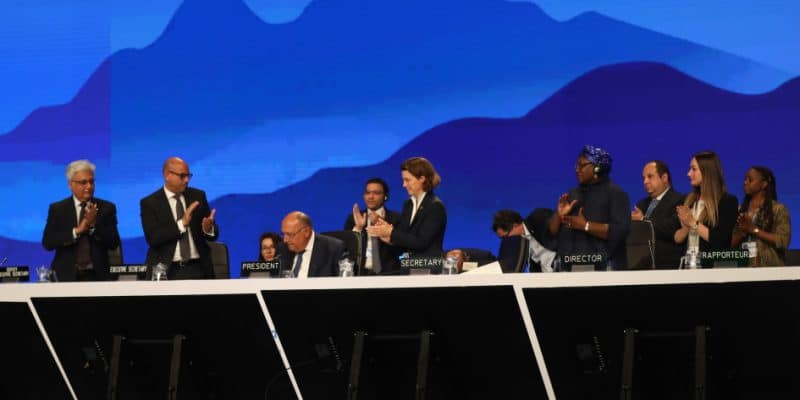The 27th United Nations Climate Change Conference (COP27) ended on a positive note. Governments from around the world agreed to create a "loss and damage" fund for countries most affected by climate change. This is an important step forward, despite the lack of agreement on reducing the use of fossil fuels that cause global warming.
This is the biggest news from the 27th UN Climate Change Conference (COP27). The world’s countries agreed to set up a financial mechanism to compensate for the “loss and damage” caused by global warming in the most vulnerable countries. The idea of such a fund is only on the official negotiation agenda at COP27. That is why most African negotiators are hailing it as a “historic step forward” that is a step towards climate justice that developing countries have been calling for for the past 30 years.
The Alliance of Small Island States (OASIS), which includes Vanuatu, Fiji, Comoros and Belize, has been talking about the need for such a fund since the beginning of the global climate talks in 1991. “We have identified a way forward in a decades-long conversation about financing loss and damage, deliberating on how we address the impacts on communities whose lives and livelihoods have been ruined by the worst impacts of climate change,” said Simon Stiell, the UN’s executive secretary for climate change at the closing ceremony of COP27 in Egypt.
The contours of the fund to be determined…
The contours of the “loss and damage” fund have yet to be defined. But according to the United Nations Framework Convention on Climate Change (UN Climate), a “transitional committee” will be set up to make recommendations on how to operationalise the new financing mechanisms and the fund at COP28 in 2023 in Dubai, United Arab Emirates (UAE). The first meeting of the transitional committee is expected to take place before the end of March 2023.
Read also- Climate emergency in Africa: time for adaptation solutions
The “loss and damage” fund is a 30-year-old battle that should give a new dimension to climate finance, which is currently lacking in the countries most vulnerable to climate change, particularly in the Horn of Africa, where drought has been threatening people’s livelihoods for nearly four years.
The thorny issue of financing the new fund
The agreement on “loss and damage” was the subject of intense negotiations in Sharm-el-Sheikh. This explains the extension of the discussions at COP27 until the final communiqué on 20 November, and not on 18 November 2022 as planned by the UN Climate. The negotiations promise to be just as perilous in 2023 in Dubai.
Already, the issue of contributors promises to be sensitive. At the heart of the negotiations is the United Nations (UN) classification of countries as “developed” or “developing”, which dates from 1992. Should this classification be used today to allocate funding? Saudi Arabia, Qatar, Russia, Brazil, Indonesia, but also India and China are among the “developing” countries, according to the rules of the time.
The European Union’s opposition
For the European Union (EU), whose negotiators did not hide their disappointment after the adoption of the agreement on “loss and damage”, the UN classification must be updated to take into account the current economic situation. “If you freeze things back to 1992, then countries that today have enormous financial means, that have had very strong growth, would be exempt from contributing to support the most vulnerable. I find that unacceptable,” says Frans Timmermans, Vice-President of the European Commission.
This is not the first time that UN member states have pledged to release funds to support climate change adaptation efforts in developing countries. The pledges made at COP15 in Copenhagen, Denmark in 2009 have still not been fully met, including the pledge by northern countries to provide the $100 billion per year, which was to be achieved by 2020.
The failure of the fossil fuel negotiations
However, the real failure of COP27 was the lack of ambition to reduce the fossil fuels that cause global warming.
Faced with the energy crisis exacerbated by the war in Ukraine and the sanctions against Russia, several European countries have re-launched their coal-fired power stations, and have logically found no interest in reducing the use of fossil fuels. This is notably the case of Germany, which in June 2022 relaunched 27 coal-fired power stations, such as the Petershagen plant in the western part of the country, in order to “compensate for the declining supplies of Russian gas”.
Read also- SOUTH AFRICA: Controversy surrounding a new gas project by TotalEnergies
The use of these polluting energies has been fiercely defended by oil and gas lobbyists. At least “636 fossil fuel lobbyists, affiliated with some of the biggest oil and gas polluters, have registered for the climate talks at COP27″, according to calculations by Global Witness and others published on Thursday 10 November 2022. This represents an increase of more than 25% compared to COP26, held in Glasgow, Scotland, a year ago.
On the other hand, African countries have defended the right to use fossil fuels, especially gas, to ensure their economic development. However, the fossil fuels produced or being explored in Africa primarily benefit Western countries. This is demonstrated by the report “Who is financing the expansion of fossil fuels in Africa?” published on the sidelines of COP27 by the German organisation Urgewald with a group of African and European associations including Reclaim Finance and Friends of the Earth. The road to decarbonation promises to be long…
Jean Marie Takouleu and Boris Ngounou







